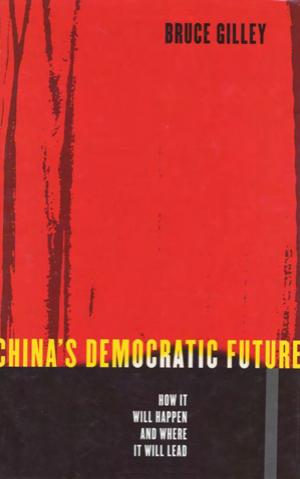China's Democratic Future: How It Will Happen and Where It Will Lead by Bruce Gilley

Author:Bruce Gilley [Gilley, Bruce]
Language: eng
Format: epub, pdf
Tags: International Relations, Political Science, General
ISBN: 9780231130844
Google: T0Yvwq2eYTAC
Goodreads: 1348356
Publisher: Columbia University Press
Published: 2004-01-15T07:05:39+00:00
International Reaction
No less than fears of domestic unrest, the threat of national disunity has been repeatedly invoked in China as an argument against democratic reforms. It is an issue that will appear frequently in the consolidation phase. Early on, it can stall democratic reforms if interim leaders revert to arguments for a firm hand to preserve unity. In the USSR and Yugoslavia, the threat of breakaway republics held up reforms at critical moments.
Tibet and Xinjiang would be the most likely sources of secessionist sentiment in the immediate aftermath of a breakthrough, although Chinaâs hidden diversity counsels us to keep in mind the possibility of division elsewhere. As the USSR example showed, the very triumph of âlegalityâ and âconstitutionalismâ on which the interim governmentâs authority partly rests creates new openings for separatism. In Tibet and Xinjiang, the âhigh degree of autonomyâ promised to these regions under the countryâs laws will suddenly seem not just viable but also necessary.
Although Tibetâs spiritual leader, the Dalai Lama, has publicly ruled out independence and sought only greater autonomy for his homeland, younger and more fiery Tibetans, especially those in exile, might seek to lead a new uprising against Chinese colonial rule like that of 1959. In Xinjiang, where avowed independence movements operate across the border, oases along the border with limited Chinese influence like Hotan, Kashgar, and Gulja could be the source of similar movements. Such activity could provide ammunition for advocates of less than complete democratization in China.
The threat of immediate breakaway is less pronounced for democratic Taiwan since the island is already totally self-governing and would be well aware of the consternation it would cause in Asia and the West if it were seen as having exploited a fragile move toward democracy in Chinaâsomething it has long advocatedâfor its own ends. As above, it might also strengthen the hand of remnant conservatives in China. There would be little incentive for Taiwan to make a preemptive declaration of independence at this stage, especially given that the longer-term prospects of democracy in China would provide brighter hopes for its eventual peaceful achievement of this.
Indeed, there may be a role for Taiwanâs leaders in supporting the changes. In the USSR in 1991, Boris Yeltsin promised to support the secession of Baltic States to gain their support and thus win the upper hand over Gorbachev by portraying him as âantidemocratic.â A similar pact might be negotiated with Taiwan. A Taiwan leader could promise to support the reformers and not declare independence in return for a promise that the future Chinese state would recognize Taiwanâs autonomy and drop threats of war.
Certainly there are normative reasons to wish that breakaway movements do not erupt anywhere in China at this stage. But the âwindow of opportunityâ presented by the transition may be too tempting. Some leaders may see the possibility of a more nationalistic China in the early years of democracy and argue for an immediate dash for freedom. It would be critical for world leaders to make it clear that they would not, at this stage, support such division.
Download
China's Democratic Future: How It Will Happen and Where It Will Lead by Bruce Gilley.pdf
This site does not store any files on its server. We only index and link to content provided by other sites. Please contact the content providers to delete copyright contents if any and email us, we'll remove relevant links or contents immediately.
What's Done in Darkness by Kayla Perrin(25490)
Shot Through the Heart: DI Grace Fisher 2 by Isabelle Grey(18208)
Shot Through the Heart by Mercy Celeste(18151)
The Fifty Shades Trilogy & Grey by E L James(17767)
The 3rd Cycle of the Betrayed Series Collection: Extremely Controversial Historical Thrillers (Betrayed Series Boxed set) by McCray Carolyn(13180)
The Subtle Art of Not Giving a F*ck by Mark Manson(12896)
Scorched Earth by Nick Kyme(11821)
Stepbrother Stories 2 - 21 Taboo Story Collection (Brother Sister Stepbrother Stepsister Taboo Pseudo Incest Family Virgin Creampie Pregnant Forced Pregnancy Breeding) by Roxi Harding(11014)
Drei Generationen auf dem Jakobsweg by Stein Pia(10208)
Suna by Ziefle Pia(10178)
Scythe by Neal Shusterman(9249)
International Relations from the Global South; Worlds of Difference; First Edition by Arlene B. Tickner & Karen Smith(8599)
Successful Proposal Strategies for Small Businesses: Using Knowledge Management ot Win Govenment, Private Sector, and International Contracts 3rd Edition by Robert Frey(8404)
This is Going to Hurt by Adam Kay(7680)
Dirty Filthy Fix: A Fixed Trilogy Novella by Laurelin Paige(6444)
He Loves Me...KNOT by RC Boldt(5795)
How to Make Love to a Negro Without Getting Tired by Dany LaFerrière(5366)
Interdimensional Brothel by F4U(5298)
Thankful For Her by Alexa Riley(5148)
